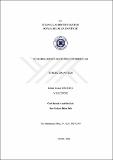JavaScript is disabled for your browser. Some features of this site may not work without it.
| dc.contributor.author | Özdemir, Gözde Canan
|
|
| dc.date.accessioned | 2019-05-29T08:18:43Z | |
| dc.date.available | 2019-05-29T08:18:43Z | |
| dc.date.issued | 2018 | |
| dc.identifier.uri | http://hdl.handle.net/11547/2327 | |
| dc.description.abstract | 4721 sayılı yeni Medeni Kanunumuzun 1 Ocak 2002 tarihinde yürürlüğe girmesi ile birlikte çok önemli değişiklikler gerçekleştirilmiştir. Bu yapılan değişiklikler arasında en önemli olanlardan birisi de “Soybağı Hukuku” alanında yapılan değişikliklerdir. Yeni Medeni Kanunumuz ile birlikte sahih nesep- sahih olmayan nesep kavramları kaldırılarak sadece “soybağı” kavramına yer verilmiştir. Evlilik içinde doğan çocuk ile evlilik dışında doğan çocuk arasında ortak hükümler öngörülmeye ve ayrıcalıklar en düşük seviyeye indirilmeye çalışılmıştır. Ancak, Eski Medeni Kanunda “nesepsiz/soybağsız” sayılan çocuklara ilişkin hiçbir düzenleme yok iken, yeni Medeni Kanunda da bu konu ile ilgili bir düzenleme yapılmamıştır. Bu konuda yeni Medeni Kanunda da düzenleme yapılmadığından dolayı, babalarına soybağı ile bağlanamayan evlilik dışı çocuk sorunsalına halen çözüm getirilememiştir. Çağımızın gelmiş olduğu nokta itibari ile gen teknolojisi ve yapay döllenme uygulamaları çoğalmış ve hız kazanmıştır. Taşıyıcı anne, sperm bankası, embriyo bağışı gibi hususların ortaya çıkması soybağının tespiti problemini tamamen çözülmesi güç ve karmaşık bir hale sokmuştur. Çalışmada soybağının tespiti ile ilgili problemlerin çözümü konusunda da çok ayrıntılı olmamakla birlikte yeni Medeni Kanun ve öğretideki görüşlerden yararlanılarak açıklık getirilmeye çalışılmıştır. Bu çalışmada Türk Hukukunda Soybağının Reddi davası, yeni Medeni Kanun ile gerçekleştirilen yenilikler ışığında, bu konudaki öğretideki görüşler, Anayasa Mahkemesinin iptal kararı ve Yargıtay İçtihatları ile ele alınmış, incelenmiştir. | tr_TR |
| dc.language.iso | tr | tr_TR |
| dc.publisher | İSTANBUL AYDIN ÜNİVERSİTESİ SOSYAL BİLİMLER ENSTİTÜSÜ | tr_TR |
| dc.subject | Babalık Karinesi | tr_TR |
| dc.subject | Soybağı | tr_TR |
| dc.subject | Soybağının Reddi | tr_TR |
| dc.subject | Yapay Döllenme | tr_TR |
| dc.subject | Yumurta Bağışı | tr_TR |
| dc.subject | Presumption of Paternity | tr_TR |
| dc.subject | Lineage | tr_TR |
| dc.subject | Denial of Lineage | tr_TR |
| dc.subject | Artificial Insemination | tr_TR |
| dc.subject | Egg Donation | tr_TR |
| dc.title | TÜRK HUKUKUNDA SOYBAĞININ REDDİ DAVASI | tr_TR |
| dc.type | Thesis | tr_TR |
| dc.description.abstractol | With the inurement of our new Civil Code No. 4721 on 1 January 2002, significant changes have been made. One of the most important among these changes made is the one made in the field of “Lineage Law”. Along with the new Civil Code, the concept of “lineage” has been put into place by removing the concepts of “legitimacy” and “illegitimacy”. Common provisions have been set forth among the child born in wedlock and the child born out of wedlock, and the privileges have been tried to be reduced to the lowest level. However, in the old Civil Code, there is no regulation regarding children who are considered “illegitimate/non-lineage”, but no regulations were made in the new Civil Code as well. Since this regulation was not included neither in the old nor the new Code, the problem of the children born out of wedlock who cannot be linked to their fathers by a lineage has not been solved. As our age has come to the point where the gene technology and artificial insemination practices have proliferated and gained speed. The emergence of such issues as surrogate mother, sperm bank, and egg donation has made it difficult and complex to completely solve the problem of the determination of the lineage. In the study, it was tried to clarify the solution of the problems related to the determination of the lineage tie by benefiting from views on the new Civil Code and doctrine although not very detailed. In this study, the matter of Denial of Lineage in Turkish Law has been discussed and studied together with the opinions of the doctrine in this subject, the cancellation decision of the Constitutional Court and the judicial views of the Court of Appeal in the light of newness realized by the new Civil Code. | tr_TR |
| dc.publisher.firstpagenumber | 1 | tr_TR |
| dc.publisher.lastpagenumber | 74 | tr_TR |
Files in this item
This item appears in the following Collection(s)
-
Tezler -- Thesis [3470]
